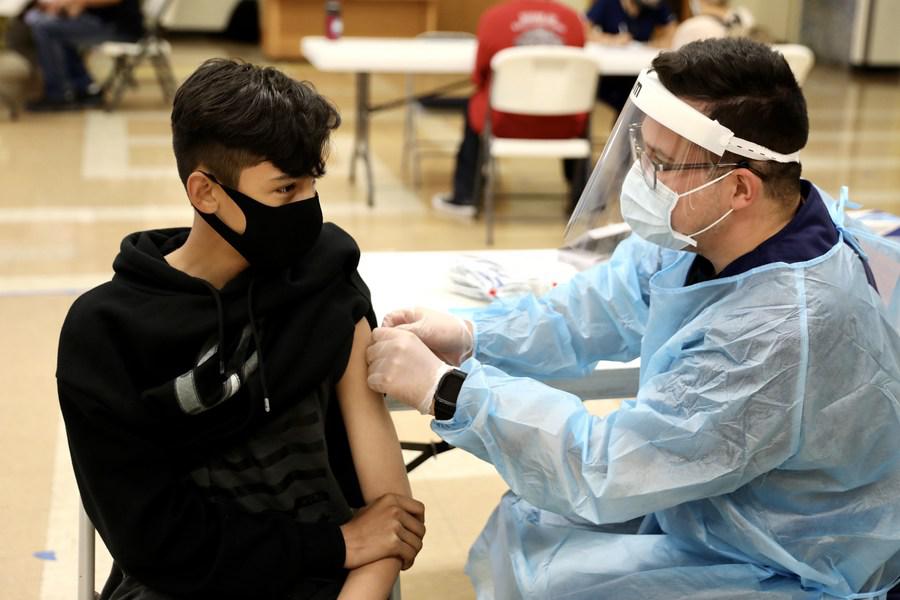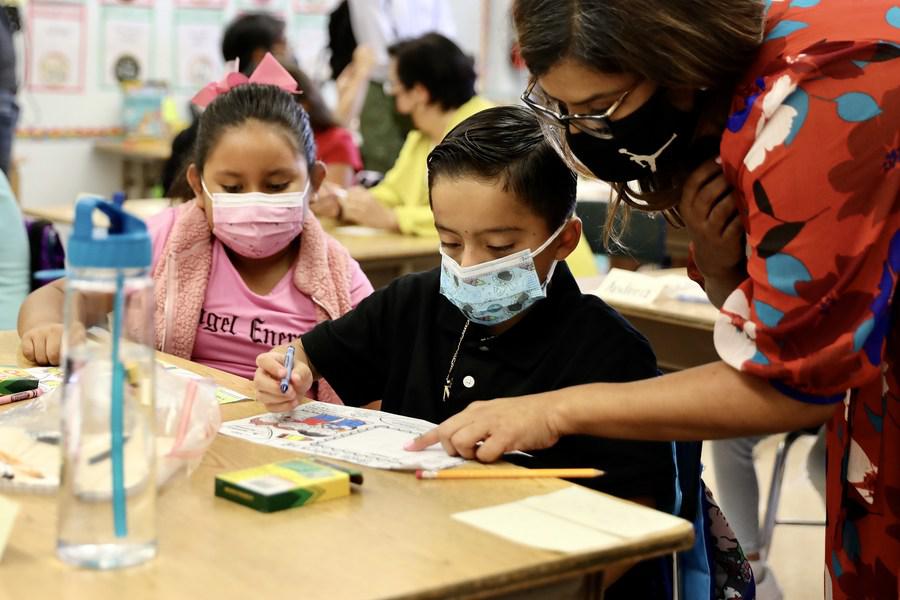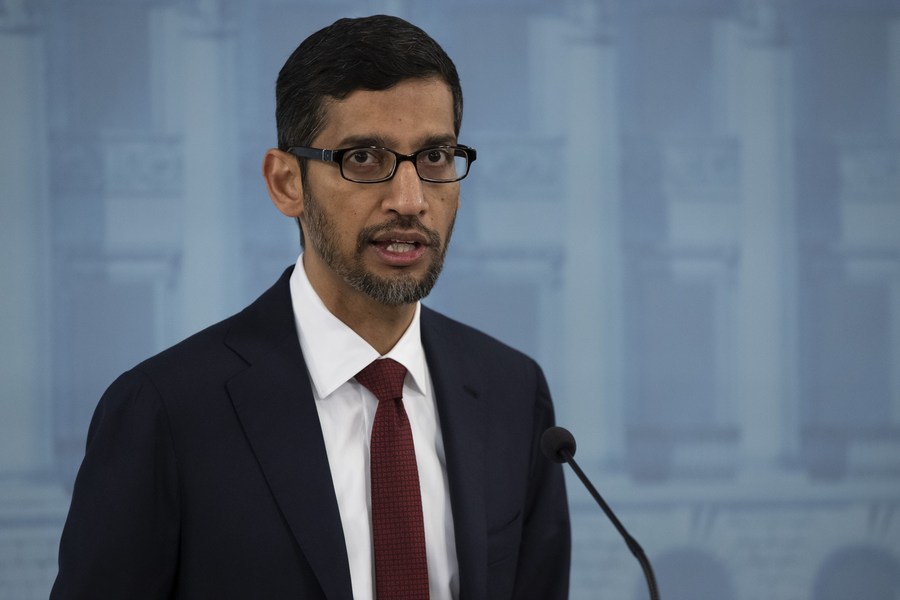COVID-19 surge wearing U.S. out in multiple sectors

A student receives a dose of the COVID-19 vaccine at the Woodrow Wilson Senior High School in Los Angeles, California, the United States, on Aug. 30, 2021. (Xinhua)
The pandemic is not only stretching hospitals in the United States thin with the surge of patients, particularly unvaccinated people and children, but also wearing the country out in the fields of tourism, tech businesses and social welfare.
NEW YORK, Sept. 1 (Xinhua) -- As the United States is surpassing an average of 160,000 new COVID-19 cases a day, the spread of the more transmissible Delta variant and the return of many students to the classroom for a new academic year seriously concern officials and health experts.
The pandemic is not only stretching hospitals thin with the surge of patients, particularly unvaccinated people and children, but also wearing the country out in the fields of tourism, tech businesses and social welfare.
SCHOOL DIVISION
More U.S. kids were hospitalized with COVID-19 this month than any other time this past year -- proving how seriously the Delta variant can hit any age group. Between Aug. 20 and 26, an average of 330 children were admitted to hospitals every day with COVID-19, according to the U.S. Centers for Disease Control and Prevention (CDC).
That's the highest rate of new COVID-19 hospitalizations among children in more than a year -- a record that was broken several times in August, according to CDC data.
CNN on Tuesday quoted doctors as saying that it's crucial to protect children against the Delta variant, not just for the sake of their health and to keep in-person learning, but also to help prevent more aggressive variants from setting the entire country back.
At a Tuesday afternoon news conference, Pennsylvania Governor Tom Wolf announced an order going into effect statewide on Sept. 7, under which masks must be worn inside buildings of K-12 schools, child care providers, and early learning programs.
"My office has received an outpouring of messages from parents asking the administration to protect all children by requiring masks in schools," said the governor in a prepared statement. "The science is clear. The Delta variant is highly transmissible and dangerous to the unvaccinated, many of whom are children too young to receive the vaccine. Requiring masks in schools will keep our students safer and in the classroom, where we all want them to be."

Students of Montrara Ave. Elementary School are seen in their in-person class in Los Angeles, California, the United States, on Aug. 16, 2021. (Xinhua)
"I preferred for local school boards to make this decision. Unfortunately, an aggressive nationwide campaign is spreading misinformation about mask-wearing and pressuring and intimidating school districts to reject mask policies that will keep kids safe and in school. As we see cases among children increase in Pennsylvania and throughout the country, this is especially dangerous and challenging as we seek to keep kids in school and maintain a safe and healthy learning environment," he added.
In contrast with Pennsylvania, Arizona ignored federal recommendations and banned school mask mandates weeks before classes resumed. Now, as the state's students are back in school, coronavirus infections are forcing thousands of children and teachers into quarantine.
"Now the back-to-school turmoil has cascaded far beyond Arizona's classrooms, igniting a political uproar for Governor Doug Ducey and other Republican leaders in this fast-changing desert battleground. The tumult underscores the perilous decisions facing governors in swing states where voters are divided over COVID-19 safety measures and personal freedoms," reported The New York Times on Wednesday.
Education groups have sued to overturn the mask-mandate ban, and more than a dozen school districts across Arizona have passed mask mandates despite the ban. The administration of U.S. President Joe Biden warned governors like Ducey and Ron DeSantis of Florida not to block federal money from pro-masking schools, according to the report.
MULTIPLE EFFECTS
Due to the surge of COVID-19 cases, CDC Director Rochelle Walensky asked at a White House COVID-19 Response Team briefing on Tuesday that unvaccinated Americans not travel during the Labor Day holiday weekend.
"First and foremost, if you are unvaccinated, we would recommend not traveling," said the director, adding that while people who are fully vaccinated can travel with precautions, current transmission rates mean they, too, need to take COVID-19 risk into consideration when deciding whether to travel.
Health experts have said that vaccination is the best way to protect against the virus' spread, and of those eligible for vaccinations, which includes Americans 12-years-old and older, 38.5 percent are not fully vaccinated yet, according to data from the CDC. This week, data presented by a CDC vaccine adviser showed a hospitalization rate 16 times greater in the unvaccinated population than in those vaccinated.
In an email to employees today, Google CEO Sundar Pichai said that even though "we are welcoming back tens of thousands of Googlers on a voluntary basis," the company will extend its voluntary return to work policy until at least Jan. 10, 2022. After that date, the current plan is to have countries and locations make mandatory return to work decisions depending on local conditions.

Google CEO Sundar Pichai attends a joint press conference in Helsinki, Finland, on Sept. 20, 2019. (Photo by Matti Matikainen/Xinhua)
The most recent plan shared publicly would have pushed Google employees back to the office at some point in September, but that won't happen. Whenever its offices expect to have employees there in-person, Pichai reiterated that there would be a 30-day heads up first.
"The letter didn't directly cite the Delta variant, but waves of infection have again wrangled plans of several Big Tech companies as they consider when and how to have employees in offices again," reported The Verge, an American technology news website. In May, Pichai outlined a new hybrid schedule of three in-office days per week, but it will be several months before that is in play for many of Google's employees.
Partly due to the coronavirus pandemic, the Social Security trust funds most Americans rely on for their retirement will run out of money in 12 years, one year sooner than expected, according to an annual government report. Two Social Security funds are overseen by the Treasury Department: the Old-Age and Survivors Insurance Trust Fund and the Disability Insurance Trust Fund.
"The finances of both programs have been significantly affected by the pandemic and the recession of 2020," the Treasury Department said in materials released on Tuesday. The combined effects of a dive in employment, interest rates, earnings and GDP, as well as higher mortality for the next few years "all significantly impact the outlook of the programs."
CNBC reported that "the circumstances, which were exacerbated by the COVID-19 pandemic, threaten to shrink retirement payments and increase health-care costs for Americans in old age sooner than expected," and "the financial outlook for Social Security and Medicare, two of the nation's preeminent safety net programs, has deteriorated over the past year."
Photos
 Dance show saluting traditional culture of the Song Dynasty makes its debut
Dance show saluting traditional culture of the Song Dynasty makes its debut Village in SW China’s Yunnan embraces prosperity through agricultural tourism
Village in SW China’s Yunnan embraces prosperity through agricultural tourism Eighth birthday for pair of giant pandas celebrated in Haikou, Hainan province
Eighth birthday for pair of giant pandas celebrated in Haikou, Hainan province Olympic gold medalists portrayed in Shanxi artist’s polymer clay sculptures
Olympic gold medalists portrayed in Shanxi artist’s polymer clay sculptures
Related Stories
- Chinese ambassador to South Africa says 'Wuhan lab leak scenario' is a fabrication
- Over 2.06 bln doses of COVID-19 vaccines administered in China
- Intelligence community unable to conduct scientific origins tracing: Yale expert
- BRI projects help Cambodia cushion economic fallout of COVID-19 pandemic
- How the USA has become a melting pot for anti-science 'viruses'
Copyright © 2021 People's Daily Online. All Rights Reserved.






